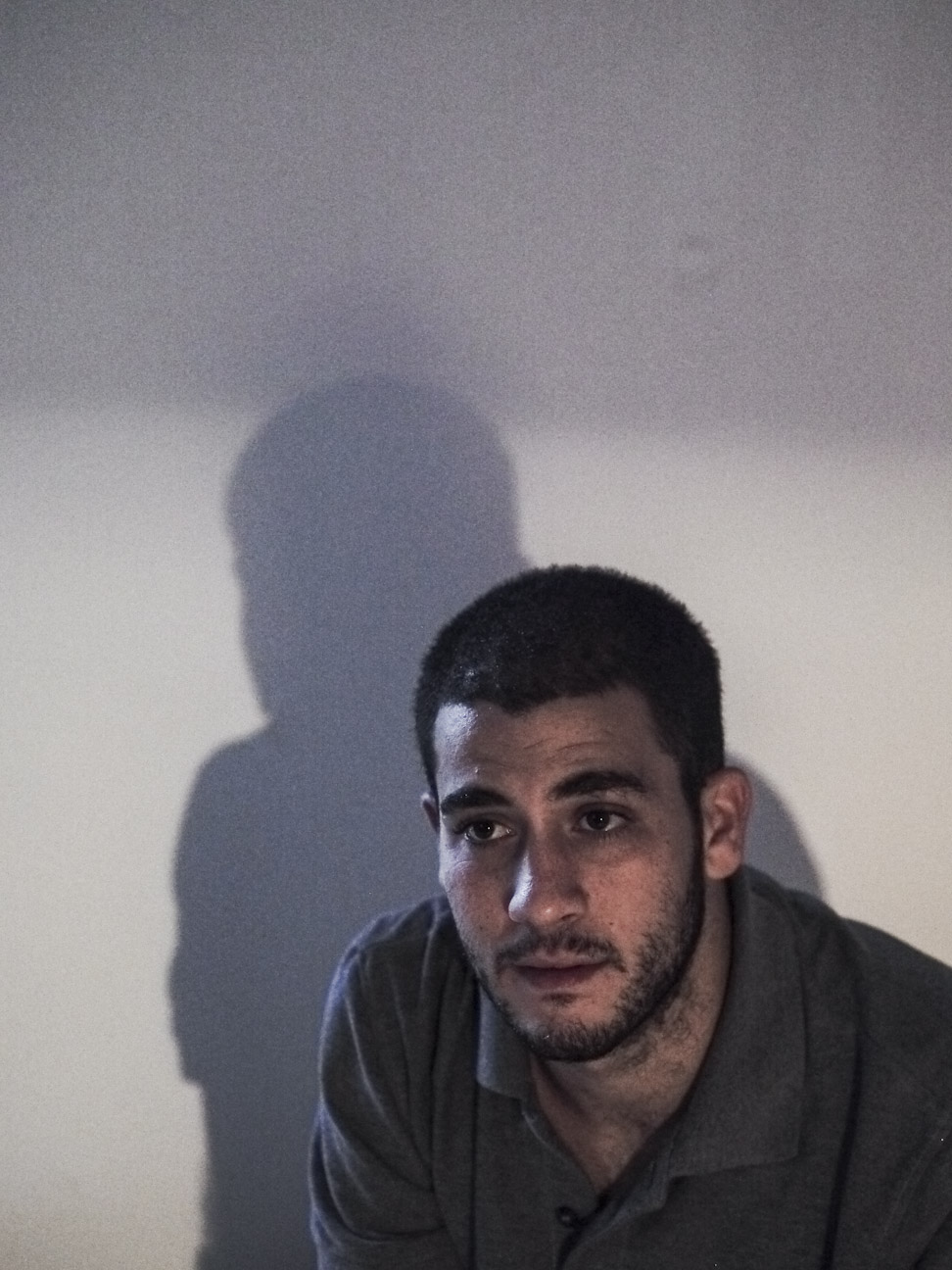When the Shell of the Body Becomes Irrelevant: A Palestinian Activist in Israel
By Ben EhrenreichNovember 24, 2013
:quality(75)/https%3A%2F%2Fdev.lareviewofbooks.org%2Fwp-content%2Fuploads%2F2013%2F11%2FCredit-Peter-van-AgtmaelMagnum-Photos-4.jpg)
All photographs by Peter van Agtmael: Magnum Photos
LATE ONE NIGHT last summer, I met Razi Nabulsi in the seaside city of Haifa. We sat on a beat-up couch on the rooftop outside his small apartment and Nabulsi, who is 25, talked about the novel he was working on, interrupting himself frequently with his own laughter. “It’s about the human condition,” he said, cracking up at the absurdity of the notion. He recovered and went on: The Angel of Death goes to god to tender his resignation. [Chuckles.] He’s tired. His work no longer brings him any joy. [Chortles.] All the people he’s killing are already dead and he doesn’t see the point of it. [Giggles.] Even alive, they’re nothing but a bunch of chemicals, pure inert matter. [Guffaws.] He’s just turning them from one dead material into another. [Bent over, joyously clutching his stomach.] A neighbor in the apartment across from Nabulsi’s stuck his head out the window. In Arabic, Nabulsi apologized for the noise.
“No,” said the neighbor, “it’s okay.” He lit a cigarette and leaned out the window, staring into the night.
If Nabulsi’s neighbor wasn’t listening in on his conversations, someone certainly was. Nabulsi, a Palestinian citizen of Israel who studies philosophy and politics at Haifa University, has been a political activist since he was 17. Most recently, he was involved in organizing protests against the proposed Prawer Plan, which would force the eviction of tens of thousands of Bedouins from their villages in the Negev desert. Nabulsi has been arrested twice at demonstrations — a modest number for a Palestinian activist — and as of the summer, had four times been “invited” in for interrogations by the Shabak, Israel’s internal intelligence service, also known as the Shin Bet.

When we met again last month, at a coffee shop a few blocks from his apartment, Nabulsi’s laughter felt a little jittery. He was chain smoking and his leg didn’t stop jumping beneath the table for the hour that we talked. Three weeks earlier, on the morning of October 9, he woke to a knock at the door. It was the police. They had a warrant, they told him. Four officers searched his bookshelves, his desk, everything. They took his computer, a laptop, a hard drive, his cellphone, his papers, and two books, one by the Palestinian novelist Ghassan Kanafani and another by the journalist and political cartoonist Naji al-Ali. (Both men’s assassinations, in 1972 and 1987, respectively, are widely blamed on the Mossad). “They claimed it was ‘inciteful literature,’” Nabulsi laughed.
The police took Nabulsi with them. At the station, as Nabulsi sat shackled, they began the first of several surreal interrogations. “They asked me about statuses on Facebook, my blog, some articles,” he said. They were particularly interested in a line he had posted on Facebook from a song by the Lebanese-Palestinian singer Julia Boutros — “One day the nightmare will be over” — which, he said, they read as a call for the destruction of the Israeli state. They brought up other posts — fliers for demonstrations against the Prawer Plan and for a campaign protesting a popular Jordanian rock band’s tour of Israel. “They said I was inciting people to go out to the streets to demonstrate.”
Nabulsi was jailed for a week and interrogated in three two-to-three hour sessions. “The Shabak would peek in every once in a while,” he said. “The whole interaction was really silly. They were asking me about things I had written, but they had the material, so why were they asking me?” Between interrogations, he sat through four court hearings in which a prosecutor attempted to convince the judge that Nabulsi’s writings and Facebook statuses were a threat to the Israeli state. The investigation against him, the prosecutor revealed at one hearing, had begun on July 10, when activists around Israel, Gaza, and the West Bank were organizing strikes and demonstrations to protest the Prawer Plan. Some of the evidence submitted against Nabulsi remained secret, even from his defense attorney. Nabulsi laughed: “They are accusing me of publishing things, so how can the evidence be both secret and published?”

In the end, Nabulsi was released, confined to house arrest, and banned from any contact with computers or telephones for five days. When we met, he was back to compulsively checking Facebook on his iPhone. He has, he said with a giggle, 1,800 friends. No charges have yet been filed, but the case remains open, which means he could face an indictment at any time. “Because of my organizing about Prawer,” he speculated, “they were trying to shut me up.”
I asked Nabulsi if his literary efforts had ever come up. His interrogator, he said, “told me he didn’t care about my work. He only cared about the political things.” He laughed, feigning hurt feelings, but it clearly wasn’t funny. The police have not returned his computers, his hard drive, or his notebooks. “It’s all gone, three years of work”: his novel, stories, essays, ramblings, “everything I’ve been philosophizing about.” The Angel of Death novel was by his estimate about five months away from being done.
He hadn’t stopped writing. With less hilarity than he had been able to summon over the summer, he summarized his latest blog post, a baroque Promethean allegory about truth, the self, and freedom in which the Self runs through the mountains until, “the shell of the body becomes irrelevant,” and the Self experiences such “an overwhelming sense of freedom” that even the wild animals leave it alone. At the top of the mountain, the Self lights a fire and carries it back as a torch. The body, scratched by thorns and brambles, tries to drag the Self back into its clutches, but the Self is already free.
When I asked him what it all meant, Nabulsi laughed. Of course. “That’s what my friend” — he pointed to the waiter — “and I have been discussing for the last five hours,” he said, launching into a long and complex explanation. Finally he gave up and smiled. “They just arrested my body.”
—Ben Ehrenreich
¤
LARB Contributor
Ben Ehrenreich is the author of The Suitors and Ether. His next book, The Way to the Spring, which is based on his reporting from the West Bank, will be published in June by Penguin Press.
LARB Staff Recommendations
Debating Israel and Palestine at the Modern Language Association Convention
Wherein professors of language and literature duke it out over the Israel boycott and a resolution censuring Israeli travel policy HAVE YOU HEARD...
Of Prophets and Tradesmen
Jordan Chandler Hirsch reviews Yossi Klein Halevi’s Like Dreamers, a micro-biography of modern Israel.
Did you know LARB is a reader-supported nonprofit?
LARB publishes daily without a paywall as part of our mission to make rigorous, incisive, and engaging writing on every aspect of literature, culture, and the arts freely accessible to the public. Help us continue this work with your tax-deductible donation today!